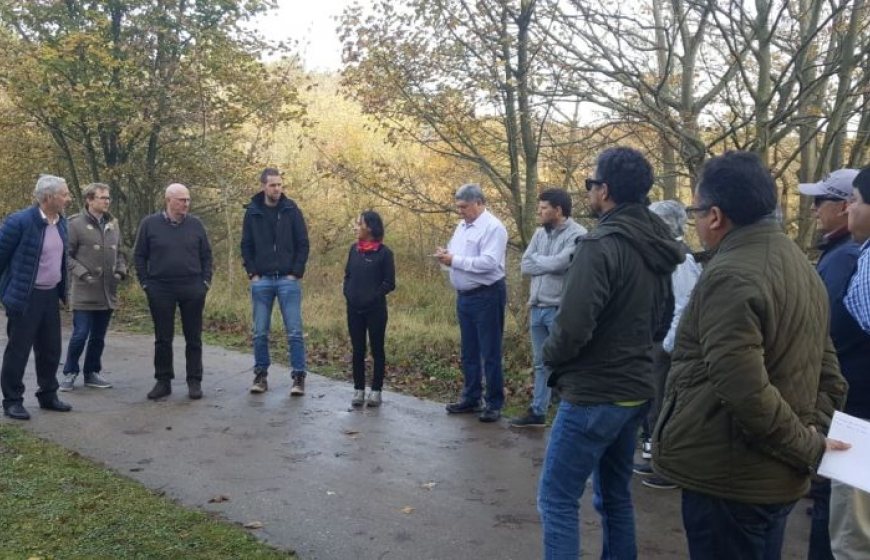News
22 November 2018Chile continues Dutch cooperation on integrated river basin management

A Chilean water mission visited the Netherlands in mid-November to meet various specialists and to see successful solutions in real life. The visit was a follow-up to the Partners for Water project ‘GIRAGUA - integrated management and efficient use of water resources in the Coquimbo region’ and fit into the government-to-government water programme for Chile and the Netherlands. Mission coordinator Cristian Baquedano states that it was a valuable visit that strengthened the basis for further cooperation in the near future.
What is the project that Dutch parties have carried out in your region?
“One of the main challenges for Chile is the availability of water to support the economic and urban development of the country. The current situation is not sustainable. Lack of water supply and rise in water demand are causing increasing stress on water resources. This stress leads to quantitative, qualitative, and governmental challenges.
“The purpose of the GIRAGUA project is to help deal with these challenges by developing a method for integrated river basin management and to assess the feasibility of applying this method to the Elqui River basin. The understanding of the local natural water and subsurface systems in combination with water treatment technologies will be analysed, and stakeholders from various fields will be involved.”
What is the status of the project?
“The feasibility study, made possible with financial support from the Partners for Water programme and the government of the Coquimbo Region, is ready. The study focused on the challenges I mentioned by looking at an entire river basin and involving the major stakeholders who have large water demands. This includes agricultural areas, urban developments, and industry, and both water quality and water quantity were taken into account. As part of the study, possible technologies and water-related practices were identified that can be implemented to improve the current situation. This will increase urban and rural resilience to climate change. Also, governance and stakeholder processes were analysed at local, regional, and national scales, and other gaps in scientific knowledge, governance, policy, finance, technologies, and practices were identified.”
What will be the next step?
“Upon successful completion of the study, the Regional Government of the Region of Coquimbo has indicated that the method developed in the feasibility project is intended to be piloted in 2019. A new application has been submitted to Partners for Water subsidy programme for the implementation of the pilot, with half of the necessary funding coming from our region. The decision on the award will be announced mid-December.”
What was the purpose of the visit to the Netherlands?
“We were in Holland specially to learn more about the Dutch expertise regarding water governance, domestic and industrial waste water, and aquifer recharge management. The programme included visits to and discussions with Deltares, IHE Delft, Wageningen University and Research, drinking water companies, Dutch Water Authorities, and the Ministry for Infrastructure and Water Management. The programme gave us the possibility to see in practice how the integrated solutions work in terms of applied technologies, governance structures, and stakeholder participation. The mission was composed of representatives of the Elqui River Surveillance Board, Aguas del Valle drinking water and waste water treatment, the University of La Serena, the CEAZA Scientific Centre, and the Regional Corporation of Productive Development.”
What did you gain from the mission?
“We now want to take a next step and examine how we can continue to work together. During the mission we have gained a convincing picture of the expertise that the Dutch water sector can supply. This will definitely help us to go ahead. The integral approach is important, as is joining forces in the triangle of government, knowledge institutes, and the private sector, with representatives from the mining and agriculture sectors, for example. This was reflected in the composition of the mission, with representatives from regional government as well as science and the public sector.”
Does the approach also offer opportunities in other regions and on a national scale?
“Absolutely, upscaling is a very important element. During the project, a methodology was created that can be replicated in other parts of Chile and Latin America. The national government intends to apply our approach for integrated river basin management, with the involvement of all stakeholders, to other regions in Chile, with over 20 river basins. Chile as a whole will benefit from improved productivity without exhausting the country’s water resources, while maintaining good environmental quality.”
Partners for Water programme
The Partners for Water programme 2016-2021, jointly implemented by the Netherlands Enterprise Agency (RVO.nl) and NWP, supports and promotes the Dutch water sector in urban deltas and catchment areas. For more information please visit partnersvoorwater.nl (in Dutch only).